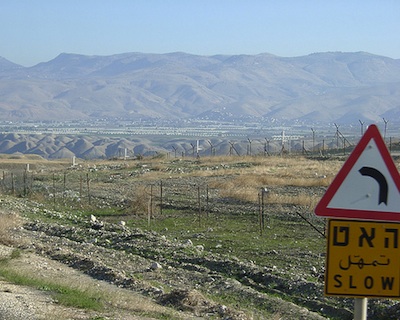According to a recent survey, most Israelis simply don’t know that the Jordan Valley, the future Palestinians state’s only non-Israeli border, is part of the occupied West Bank. This trend confirms that retaining an Israeli presence in the valley is not likely to become a wedge issue in Israel any time soon.
A poll conducted by our esteemed Dahlia Scheindlin (for ACRI’s Action a Day campaign) indicates a sweeping majority of Israelis – 63.5%, to be exact – think the Jordan valley is part of Israel; in other words, not part of the West Bank; or, in plain words, don’t understand why or how Israeli presence there is being called into question.
The special status of the valley in the Israeli collective consciousness is nothing new. Partly thanks to a highly successful campaign of displacement, Palestinian residents of this occupied territory – as occupied as Jenin or East Jerusalem – are rarely heard about in the Israeli media, and Palestinian political violence of the kind that makes Israelis notice Palestinians has been negligible in the valley through both Intifadas. The Palestinians of the valley are so invisible to most Israelis that the poll indicates 34.5 percent thought Israelis formed an overwhelming majority in the valley, while in fact it’s the other way around, with Palestinians outnumbering Israelis 6 to 1. Settlements in the valley, more than anywhere else, are referred to as “yishuvim” (communities) or even kibbutzim, signalling their character is not as religious-nationalist as stereotypical settlers, and in fact lies close to the heart of the old Israeli mainstream, the secular-Labor-Zionist. Only recently, the left-leaning youth movement Bnei Hamoshavim has begun making plans to settle its alumni in the valley, through the mediation of the decidedly centre-Left Kibbutz Movement.
Dahlia’s poll sniffs out even the hope all of the above retained some faint whiff of cognitive dissonance for Israelis. For them, it’s a lot simpler – the Jordan valley is not part of the territories, period. This is important, because the fate of the valley forms a crucial part of the two-viable-state solution; it’s meant to serve as the only non-Israeli border of the Palestinian state. Without the valley, West Bank Palestine will be a landlocked enclave, completely and entirely dependent on Israeli good grace, and will not be able to conduct independent traffic across its own border – whether of people or of gods. The poll reaffirms, then, that pushing certain moves that are pre-requisite in a two-viable-states solution – such as complete withdrawal from the valley, retaining there only military presence and evicting its Jewish residents, or leaving the residents there under the guard of an international peacekeeping force – is unlikely to garner much support among Israelis.
This would have been bad news for the peace process if there was any indication any Israeli government ever meant to allow the valley to become a sovereign border of independent Palestine. Fortunately for the disappointment-prone, this was never the case; what’s more, at the risk of sounding undemocratic I’d speculate that what the majority of Israelis know or want about the valley comes secondary to the government line – not on point of principle, morality or justice, but in the simplest of practical terms. It may well be that when asked in future posts if they support a partial withdrawal from the valley for the sake of peace, Israelis will reply that they do; a majority of Israelis support a two state solution, and know the right answers necessary to confirm this believes in themselves and in their listeners. The more curious questions will be that of what they’re meaning to do about it: Would they take to the streets, go on strike, or bring down a government that would not withdraw from the valley? Would they make it a wedge issue in future elections and vote according to a given party’s stance on such a withdrawal – and if so, would they vote for a pro- or anti- withdrawal party?
I’m not a pollster, so I can only speculate what the exact percentages will be – but this particular poll appears to signal which kind of answers are likely to take the lead.


